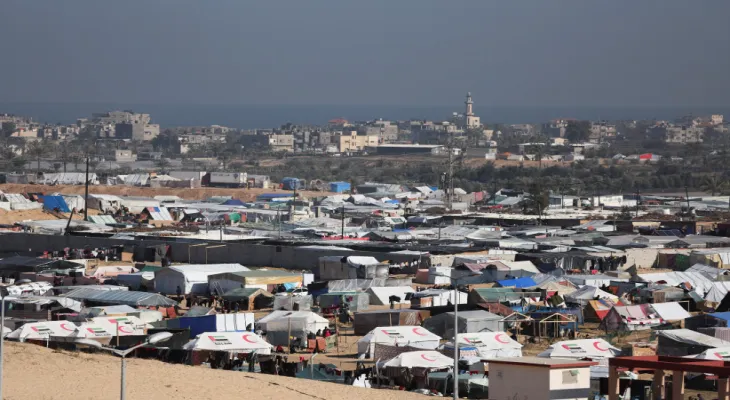Search here
Newspaper
Search here

Arab Canada News
News

Published: January 9, 2024
Three Egyptian security sources said Egypt rejected an Israeli proposal to increase Israeli supervision over the buffer zone on the border between Egypt and Gaza, prioritizing efforts to mediate a ceasefire before working on post-war arrangements.
Egypt shares a 13-kilometer (8-mile) border with Gaza, the only border of the Palestinian coastal enclave not directly controlled by Israel. Alongside Qatar, Egypt has also played a leading role in talks to mediate a new ceasefire in Gaza and secure a deal to release Israeli hostages held by Hamas.
The Egyptian sources said that during those talks, Israel contacted Egypt regarding securing the Filadelfia corridor, a narrow buffer zone along the border, as part of Israeli plans to prevent future attacks.
The current conflict began on October 7 when Hamas launched an incursion that Israel said resulted in the deaths of 1,200 people and the capture of about 240 hostages.
Israel responded with a fierce attack that killed more than 23,000 people, according to officials in Gaza, and displaced most of the enclave's 2.3 million residents from their homes.
The Jerusalem Post quoted an Israeli official, speaking on condition of anonymity, as saying that joint monitoring of the Filadelfia corridor with Egypt was among the issues discussed by the two countries.
When asked if Egypt had rejected it, the Israeli official said, "I am not aware of that."
Egypt’s Cairo News Channel quoted an anonymous source on Monday saying recent reports about planned cooperation between Egypt and Israel regarding the corridor are false.
The head of Egypt’s General Authority for Information did not respond to a request for comment.
The Egyptian sources said Israeli officials did not discuss control of the corridor during the current ceasefire talks but instead requested participation in monitoring the area, including by sharing the use of new surveillance technology that Israel will purchase.
The sources said Egyptian negotiators rejected the idea, but Egypt has strengthened physical barriers on its side of the border.
The sources added that Egypt prioritizes reaching a new ceasefire agreement as a necessary basis for discussions about post-war Gaza, including securing the corridor.
Meanwhile, Egyptian Foreign Minister Sameh Shoukry confirmed on Tuesday that priorities for Gaza are a ceasefire, delivering aid, and preventing the displacement of Gaza’s population into Egypt.
Israel controlled the Filadelfia corridor until 2005 when it ended its occupation of the Gaza Strip; Hamas took control of Gaza in 2007. At the end of last month, Israeli Prime Minister Benjamin Netanyahu said Israel seeks to reassert control over the corridor, which Palestinians have long used to operate underground tunnels.
The number of tunnels increased starting in 2008, as Palestinians used them to circumvent the Israeli economic blockade and bring weapons into the enclave. However, an Egyptian military campaign that began in 2013 managed to destroy most of them, according to Palestinian sources.
Ashraf Abu Al-Houl, editor-in-chief of the Egyptian Al-Ahram newspaper and specialist in Palestinian affairs, said, "Egypt has made it clear that it has closed all tunnels on its side of the border, but Israel still cannot grasp or understand that what they saw in Gaza could be locally made or developed."
Repeated bombardments have taken place near the border area, including at the Rafah crossing, which is used to bring humanitarian aid into Gaza from Egypt and to evacuate small numbers of Palestinians who need urgent medical treatment.
Comments